Complete Solutions to MULTIPLE CHOICE QUESTION (LEVEL-II) of chapter DESCRIPTION OF MOTION IN ONE DIMENSION of Class 12 book with complete answers and questions
| Class 12 | PHYSICS |
| Chapter | DESCRIPTION OF MOTION IN ONE DIMENSION |
| MODERN PUBLICATION | MULTIPLE CHOICE QUESTION (LEVEL-II) |
| Number Of Questions | 54 |
| Academic Year | 2023-24 |
A man moves along the path abode as shown in the Fig. What is his displacement from the point of start?
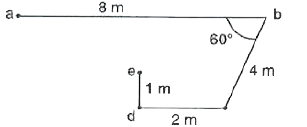
View SolutionA body is projected vertically upwards and attains maximum height H. If the time to reach height 'h' and H are in the ratio of 1:3, then the ratio`h/H` is :
View SolutionA stone weighing 2 kg falls from the top of a tower 40 metre heigh and burries itself 1m deep in sand. The time of penetration is :
View SolutionWhat is the maximum height of a stone thrown vertically upwards if its velocity is halved in 2 second ?
View SolutionThree particles A, B, C are thrown from the top of a tower with the same speed. A is thrown straight up, B is thrown straight down and C is thrown horizontally. They hit the ground with speeds `va,v_b` and `v_c` and respectively.
View SolutionThe displacement of a particle is given by `x=(t-2)^(2)` where x is in meters and in seconds. The distance covered by the particle in first 4 seconds is :
View SolutionIn the above question what is the distance covered bythe particle in 5th second of its motion ?
View SolutionIn the given graph between two physical quantities 'a' and 'b' as shown in the figure 'b' is along x-axis while 'a' is along y-axis. The plot describes the motion of a particle in a straight line then
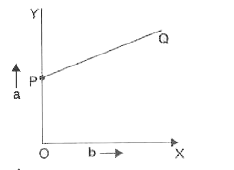
View SolutionAn object falling through a static water column is observed to have an acceleration given by the relation ang-bu where g is acceleration due to gravity and 'b' is a constant. After sufficiently long time of its release, it is observed to fall with a constant speed. What must be the value of its constant speed ?
View SolutionA bird is flying to and fro between two cars moving with constant speeds on a straight smooth road. One car is moving at 18 km/h while other is moving towards the other at 27 km/h. The bird starts moving from the first car towards the other with a speed of 36 km/h when the distance of separation between the two is 36 km. What is the displacement of the bird when the two cars meet each other?
View SolutionTwo tall buildings are standing in front of each other at a straight separations of 10 m one of them is taller than the other by 9 m. A man is running on the roof top of taller at a speed of 9 m/s horizontally and jumps as such in the hope that he will land on the roof of the building with lower height. Find will be able to land ?
View SolutionA ball is dropped from tower of height 45 m. At the same moment another ball is thrown up with a speed of 40 ms from base. What is the relative speed of the balls as a function of time?
View SolutionA car and a truck are going on a straight road each having a velocity of 72 km/h. The car cannot come to a stop in less than 3.0 sec and the truck takes 5.0 seconds time to stop on the high-way. The car is behind the truck. The truck gives a signal for stopping at a tollplaza. What should be the least distance of the car from the truck so that it does not bump onto the truck? (Take human response time to be 0.5 sec)
View SolutionTwo cars leave one after the other and travel with an acceleration of 0.4 ms. Two minutes after the departure of the first car, the distance between them becomes 1.90 km. The time interval between their departures is :
View SolutionA point mass initially at rest moves along x-axis. Its acceleration varies with time as a = 6t+ 5 ms. If it starts from origin, the distance covered by it in 1 s is
View SolutionThe deceleration experienced by a moving motor boat after its engine is cut off is given by `dv/dt` =`kv^3`, where is a constant. Ifv, is the magnitude of the velocity at cut off, the magnitude of velocity at time after the cut off is :
View SolutionA pole is held vertically with one end on the ground. The length of the pole is 30 m. The pole is allowed to fall. Assuming that the lower end of the pole does not slip with what velocity will the upper end strike the ground g = 10 m
View SolutionThe distance time graph of a particle at time t makes an angle of `45^(@)` with time axis. After 1 second it makes an angle of `60^(@)` with time axis, what is the acceleration of the particle ?
View SolutionA stone falls from rest. The total distance covered by it in the last second of its motion is equal to the distance covered by it in the first three seconds of its motion. How long does the stone remain in air?
View SolutionThree persons P, Q, R are at the three comers of an equilateral triangle of each side 1. They start moving simultaneously with velocity v such that Pathways moves towards Q Q always moves towards R and R always moves towards P. After what time they would meet each other at O?
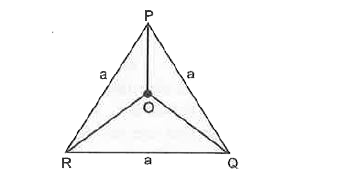
View SolutionA bus starts moving with an acceleration2 ms? A cyclist 96 m behind the bus starts simultaneously towards the bus at 20 m s-, after what time will he able to overtake the bus?
View SolutionA boat can go across a lake of length I and return in time To at a speed yo. On a rough day there is a uniform current moving with a speed y to help onward journey and impede the return journey. If the time taken to go across and return on the rough day is` t/(t_0)` then the ratio is :
View SolutionA man is at a distance from the bus: when the bus begins to move with a constant acceleration 'a', with what minimum velocity the man should run towards the bus so as to catch it?
View SolutionA ball is thrown upwards from the ground. It is at a height 100 m in upward and downward journeys at time `t_1` and ` t_2` respectively. If g = 10 `m/s^(2)`, then the product of `t_1 . t_2` is:
View SolutionBetween two stations a train accelerates uniformly at first, then moves with constant velocity and finally retards uniformly. If the ratio of the time taken for these is 1:8:1 and the maximum speed attained be 60 km h- then what is the average speed over the whole journey ?
View SolutionIn the given v -1 graph, the distance travelled by the body in 5 second will be
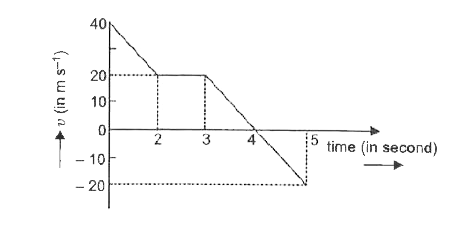
View SolutionThe graph shown in Fig. shows the velocity v tk versus time for a body, Which of the graphs shown below represents the corresponding accelera-tion versus time graphs ?
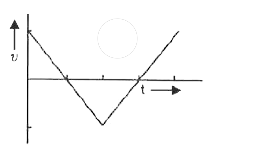
View SolutionFigure here gives the speed-time graph for a body. The distance travelled between I = 1.0 second and t = 7.0 second is nearest to:
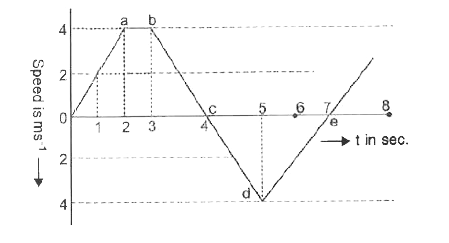
View SolutionFor the velocity time graph shown in the figure below the distance covered by the body in last two seconds of its motion is what fraction of the total distance covered by it in all the seven seconds ?
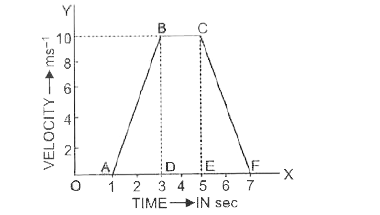
View SolutionThe velocity-time graph of a particle moving along a straight line is shown in Fig. The displacement of the body in 5 second is :
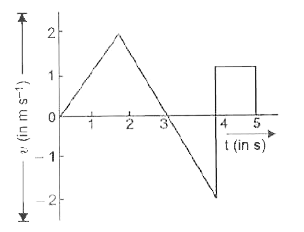
View SolutionThe position x of a particle varies with time t as `x = at^(2) -bt^(3)`. For what value of time acceleration is zero?
View SolutionA boy walks to his school at a distance of 6 km with constant speed of 2.5 km/h and walks back with a constant speed of 4 km/h. His average speed for the round trip is:
View SolutionA particle is dropped from rest vertically from a height The time taken by it to fall through successive distances of 1 m cach will then be :
View SolutionThe position of a particle moving in a x - y plane at any instant is given by`x= (3t^(2)-6t)` metres `y = (t^(2)-2t)` metres. Select the correct statement.
View SolutionA ball falls on the surface from 10 m height and rebounds to 2.5 m. If the duration of contact with the floor is 0.01 sec. Then average acceleration during contact is:
View SolutionThe acceleration a' in ms-2 of a particle is given by a = `3t^2` +2t+2, where is the time. If the particle starts with a velocity v = 2 m s-at i=0 then velocity at the end of 2 sec is:
View SolutionThe x and y co-ordinates of a particle at any instant are `x = 4t^2` + 7t and y = 5t where x, y are in metres and in seconds. The acceleration at t=5s is :
View SolutionTwo stones are thrown from the top of a tower, one straight down with an initial speed and the second straight up with the same speed. When the two stones hit the ground, they will have speeds in the ratio :
View SolutionA lunar landing module is descending toward the moon's surface at a steady velocity of 10 ms. At a height of 120 m, a small objects falls from its landing gear. Taking the moon's gravitational acceleration as 1.6 ms , at what speed (in ms) does the object strike the moon ?
View SolutionA car starts from rest and moves with constant acceleration. The ratio of distance covered by the car in nth second with that covered in n seconds is:
View SolutionA balloonist release a ballast bag from a balloon rising at 40 ms at a time when the balloon is 100 m above the ground. If g = 10m/s2 then the bag reaches the ground in:
View SolutionTwo bodies begin a free fall from the same height at a time interval of Ns. If vertical separation between the two bodies is 1 after second from the start of the first body, then is equal to :
View SolutionA boy releases a hall from the top of a building. It will clear a window 2 m high at a distance 10 m below the top in nearly :
View SolutionTwo balls are projected simultaneously with the same speed from the top of a tower, one vertically upwards and the other vertically downwards. They reach the ground in 9 second and 4 second respectively. The height of the tower is:
View SolutionA particle travels half the distance with a velocity of 6 ms. The remaining half distance is covered with a velocity of 4 ms for half the time and with a velocity of 8 ms for the rest of the half time. What is the velocity of the particle averaged over the whole time of motion?
View SolutionA body starts from a point with a velocity and uniform acceleration a. The direction of acceleration is reversed when the velocity of the body becomes 5u. The velocity of body al point will be
View SolutionThe greatest acceleration or deceleration that a train may have is a. The minimum time in which the train can get from one station to the next at a distance s is:
View SolutionIf the velocity of a car in increased by 20%, then the minimum distance in which it can be stopped increases by:
View SolutionThe acceleration of a particle increasing linearly with timer is be. The particle starts from the origin with an initial velocity, The distance travelled by the particle in time will be
View SolutionA ball is dropped vertically from a height above the ground. It hits the ground and bounces up vertically to a height d/2. Neglecting air resistance its velocity varies with the heighth above the ground as:
View SolutionA ball is released from the top of a tower of heighth metre. It takes T second to each the ground. What is the position of the ball at `T/3`second ?
View SolutionA particle stars from rest. Its acceleration (a) versus time (t) is as shown in the figure . The maximum speed of the particle will be:
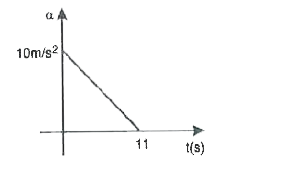
View SolutionThe velocity of particle is v=`v_0` +gt+`ft^(2)` if its position is x =0 at t=0, then its displacement after unit time is:
View SolutionAn object moving with a speed of 6.25 m/s , is decelerated at a rate given by: `(dv)/(dt)= -2.5sqrt(v)`
where v is the instantaneous speed The time taken by the object to come to rest would be:
View Solution
MULTIPLE CHOICE QUESTION (LEVEL-II) questions and complete solutions for chapter DESCRIPTION OF MOTION IN ONE DIMENSION of MODERN PUBLICATION PHYSICS (KANNADA ENGLISH) of Class 12